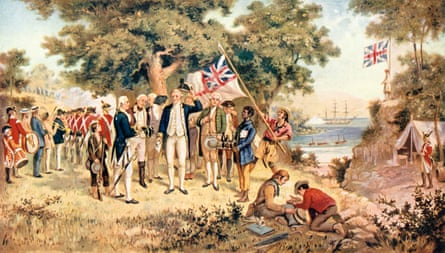I
In 1891, Rudyard Kipling wrote The English Flag in support of the ongoing expansion of the British empire. He questioned, “What do those who only know England truly know about it?” Kipling expressed sorrow for his fellow countrymen who lacked awareness of the sacrifices made overseas in the name of England. He also believed that despite their patriotism, they failed to embrace the imperial mission of civilizing other nations.
In his book, Empireworld, Sathnam Sanghera explores the uncomfortable impact of empire around the world, including Britain’s tendency to overlook this history. This work is a follow-up to Empireland (2021), which delved into the effects of empire within Britain, such as the influx of immigrants that contributed to the success of the NHS and the widespread appreciation for Indian cuisine.
Sanghera, born in Wolverhampton in 1976 to Indian immigrants, writes with a genuine perspective and sincerity, having personally experienced the subject matter. He shares that the racial harassment he faced following the release of Empireland was “as routine as my daily breakfast”.
The author’s latest book aims to explore the impact of the British empire on people and places throughout its history. Before delving into the negative aspects of imperialism, Sanghera acknowledges the positive contributions that are still debated today. These include the widespread use of the English language as a means of unifying diverse populations, and the Westminster model of democracy, which he argues has been successfully maintained in former British colonies. However, not everyone shares this viewpoint – former governor of Tanganyika, Richard Turnbull, once famously stated that the empire’s only lasting legacies were the game of football and a vulgar expression.
Sanghera frequently journeys to various destinations such as India, Barbados, Mauritius, and Nigeria to collect personal accounts. In the past, Barbados proudly identified as Little England and even had its own Trafalgar Square statue of Lord Nelson. However, in 2021, it transitioned into a republic and Prime Minister Mia Mottley announced that Barbados is owed reparations of £3.9tn for the actions of enslaving nations.
During a visit to a colonial manor house, Sanghera is taken aback by the lack of acknowledgement regarding slavery. Afterwards, the guide expresses frustration that visitors only seem to appreciate the achievements of their white ancestors. This attitude reflects the pragmatic approach of a society trying to suppress its anger.
Upon arriving in Mauritius, Sanghera observes that the aftermath of slavery saw the implementation of mass indentureship for Indian migrants, which Gandhi referred to as “semi-slavery”. This resulted in a society where the legacy of the empire is reflected in competing hierarchies of suffering, fueled by the memories of British administrators who favored certain groups over others. This approach of division was also replicated in colonial Nigeria and India, as the British intentionally recruited groups such as the Hausa and Sikhs for their “martial race” status.
Sanghera’s journeys are often too short for him to thoroughly explore his topic. However, his tense visit to Lagos in Nigeria is particularly interesting to read about because his anxiety (completing a “proof of life” document that would be used if he were ever kidnapped) highlights the danger of violence and inequalities in wealth that have been influenced by colonialism. In response to the widespread insecurity, he notes, “many families have established themselves as independent, self-sufficient units in the absence of a functional government.”

Display the image in full screen mode.
The indictment against imperialism continues to grow with each page, despite Sanghera’s attempt to offer more nuanced perspectives. He suggests that the imperial project would not have been possible without quinine, which had the ability to save white people from death despite not fully preventing them from getting severely sick with malaria. The chapter on Useful Plants delves into the development of Kew Gardens as a hub for “economic botany” from 1841 onward, including the cultivation of cinchona species that produced more effective quinine. Visitors to Kew Gardens today may not be aware of its complicated history, as Sanghera reveals: “[British colonists] used plants to cause ecological and climate disasters, yet also sparked conservation efforts and established one-crop economies that drastically altered our planet… It’s mind-boggling!”
Sanghera’s voice is consistently present in the book as a generalist, summarizing the ideas of experts. However, his frequent use of equivocal language and qualifying statements may cause some readers to question the conviction of his beliefs.
The author mentions the concept of “blindfolded British justice” which separated the white ruling class from the colonized, allowing British wrongdoings to often go unpunished. He gives an example from the 1890s where a soldier, Private John Rigby, was only fined 100 rupees for killing a servant after accusing him of falling asleep on duty. Despite acknowledging the British empire’s role in perpetuating racism worldwide, the author also notes that it sparked a significant anti-racism movement.
The undeniable foundation of slavery was rooted in racism. While the passing of time may lessen emotional reactions to it, Sanghera agrees with the assertion of epigeneticists that even in the modern era, black individuals may experience psychological effects from the repercussions of slavery long after its abolishment. This perspective is also supported by the late psychiatrist Frederick Hickling, whose research connects contemporary anxieties about absent black fathers to the historical practice of separating men and women in slave quarters and only allowing them to come together for reproductive purposes in order to increase the enslaved population.
Hickling is among the scholars whose expertise Sanghera relies on, resulting in his own analysis being overshadowed by the abundance of information and references presented in Empireworld. This often gives the impression of a comprehensive review of literature.
However, the book is thoroughly researched and Sanghera deserves credit for his courage. Despite his goal of promoting understanding rather than inciting white guilt, he is aware that this work may not be well received by those who are nostalgic for the bigoted empire.
Britain’s talent for influencing public opinion has historically been utilized to portray its empire as valiant rather than malevolent. This tactic has also been adopted in the United States, where the discourse surrounding the preservation of history – particularly in regards to concerns about the potential harm on young minds exposed to traumatic content – has led many conservative pundits to extol the supposed advantages of slavery for those who were enslaved. While such outrageous arguments have not gained widespread approval in Britain, they serve as a reminder of the appeal of manipulating historical narratives.
Contemporary literature on imperialism has exposed unpleasant realities that were previously hidden. The existence of empireworld poses a challenge for those who romanticize and glorify colonialism, as they struggle to contain the negative consequences that have been revealed.
Source: theguardian.com
